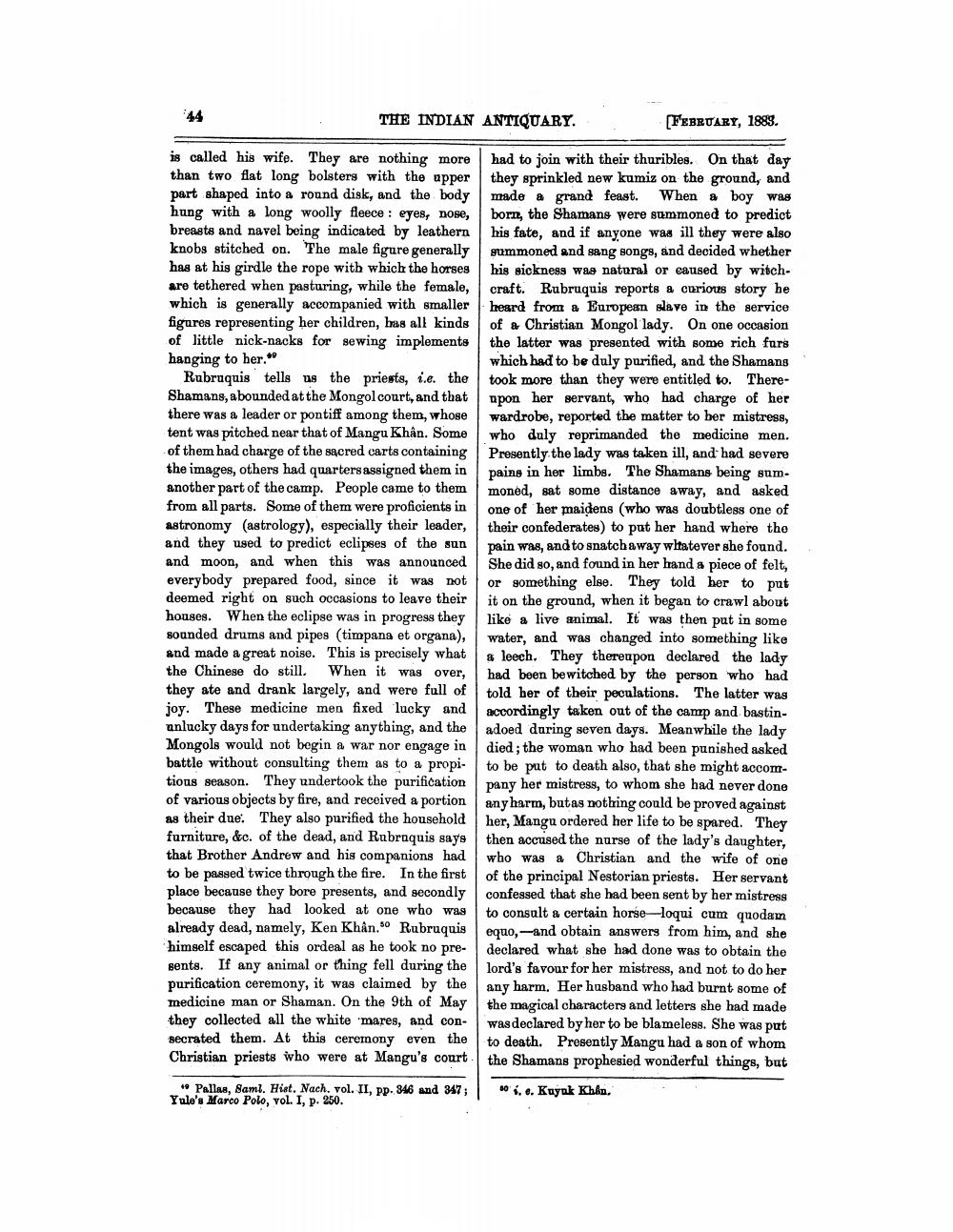________________
44
THE INDIAN ANTIQUARY.
(FEBRUARY, 1883.
is called his wife. They are nothing more than two flat long bolsters with the apper part shaped into a round disk, and the body hung with a long woolly fleece: eyes, nose, breasts and navel being indicated by leathern knobs stitched on. The male figure generally has at his girdle the rope with which the horses are tethered when pasturing, while the female, which is generally accompanied with smaller figures representing her children, bms all kinds of little nick-nacks for sewing implements hanging to her."
Rubruquis tells us the priests, i.e. the Shamans, abounded at the Mongol court, and that there was a leader or pontiff among them, whose tent was pitched near that of Mangu Khân. Some of them had charge of the sacred carts containing the images, others had quarters assigned them in another part of the camp. People came to them from all parts. Some of them were proficients in astronomy (astrology), especially their leader, and they used to predict eclipses of the sun and moon, and when this was announced everybody prepared food, since it was not deemed right on such occasions to leave their houges. When the eclipse was in progress they sounded drums and pipes (timpana et organa), and made a great noise. This is precisely what the Chinese do still. When it was over, they ate and drank largely, and were full of joy. These medicine men fixed lucky and unlucky days for undertaking anything, and the Mongols would not begin a war nor engage in battle without consulting them as to a propi- tious season. They undertook the purification of various objects by fire, and received a portion as their due. They also purified the household furniture, &c. of the dead, and Rubraquis says that Brother Andrew and his companions had to be passed twice through the fire. In the first place because they bore presents, and secondly because they had looked at one who was already dead, namely, Ken Khân. Rubruquis himself escaped this ordeal as he took no presents. If any animal or thing fell during the purification ceremony, it was claimed by the medicine man or Shaman. On the 9th of May they collected all the white mares, and con- secrated them. At this ceremony even the Christian priests who were at Mangu's court
* Pallas, Baml. Hist. Nach. vol. II, pp. 346 and 347; Yule's Marco Polo, vol. I, p. 250.
had to join with their thuribles. On that day they sprinkled new kamiz on the ground, and made a grand feast. When a boy was born, the Shamans were summoned to predict his fate, and if anyone was ill they were also summoned and sang songs, and decided whether his sickness was natural or caused by witchcraft. Rubruquis reports a curious story be heard from a European slave in the service of a Christian Mongol lady. On one occasion the latter was presented with some rich furs which had to be duly purified, and the Shamans took more than they were entitled to. Thereapon her servant, who had charge of her wardrobe, reported the matter to ber mistress, who duly reprimanded the medicine men. Presently the lady was taken ill, and had severe pains in her limbs. The Shamans being summoned, sat some distance away, and asked one of her maidens (who was doubtless one of their confederates) to put her hand where the pain was, and to snatchaway witatever she found. She did so, and found in her hand a piece of felt, or gomething else. They told her to put it on the ground, when it began to crawl about like a live animal. It was then put in some water, and was changed into something like a leech. They thereupon declared the lady had been bewitched by the person who had told her of their peculations. The latter was accordingly taken out of the camp and bastinadoed during seven days. Meanwhile the lady died; the woman who had been punished asked to be put to death also, that she might accompany her mistress, to whom she had never done any harm, butas nothing could be proved against her, Mangu ordered her life to be spared. They then accused the nurse of the lady's daughter, who was a Christian and the wife of one of the principal Nestorian priests. Her servant confessed that she had been sent by her mistress to consult a certain horse-loqui cum quodam equo,--and obtain answers from him, and she declared what she had done was to obtain the lord's favour for her mistress, and not to do her any harm. Her husband who had burnt some of the magical characters and letters she had made was declared by her to be blameless. She was put to death. Presently Mangu had a son of whom the Shamans prophesied wonderful things, but
1... Kuyuk Khln.




